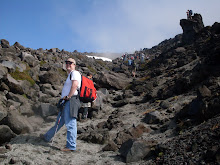Rabbi Or Rose tells me that rabbis of old have long taught that the highest form of human discourse is Makhloket, or disagreement. First we recognize our own limits, and then we proceed to clarify our positions as best we can. When we sustain the tension between us, each pulling our own way, we create emptiness between us. In this emptiness, Rabbis say, God creates. As it was in the beginning, so it is today. In the presence of one another, in the moment when our positions of clarity are matched with humility, the possibility of a truly new idea emerges, a solution, a way forward. Creation continues, and we all gain.
If people refuse to listen to those outside of their group, a statis is reached where no new ideas are generated. My life has been richer because of listening to others and taking seriously their ideas. I am not so sure about the involvement of God, but that is neither here nor there. Later in the article he gives some specific examples of how atheism is important.
Atheism at its best participates. It refuses to stay isolated until billions of people cease to be religious. Instead of simply dismissing religion, it engages with it constructively so that the world is better for it. Atheism at its best is an expression of faith in humanity, even faith in religious humanity, for however misguided we religious people might be, we are human, too. Atheism at its best asks us to enjoy our faith life, but with the understanding that our religions are "God-management systems," an attempt -- however honorable and perhaps necessary -- to manage a reality that is larger and more complex than our own religions. Atheism at its best is a guardian of secularization, a process of creating a common and safe space where our worldviews -- including religious ones -- can share their treasures and expose themselves to the entire world as their ethical community. Atheism at its best insists that religious people learn to live on Earth. Religion that does not work on Earth, they argue, does not work at all. Good point. To us religious people, atheists are not only precious neighbors but also strangers who see what we cannot see and ask questions that we don't know how to ask -- all the while acknowledging the good that religion brings. Atheists are God's whistleblowers.
I am currently reading Karen Armstrong's latest book, "The Case for God." In one chapter she writes about a religious tradition, where practioners reinforce the inadequacy of human language to describe god. Basically the practioner would start by listing off attributes of God. They would then list off the negative of the attribute. For example. God is love; God is omnipotent; God exists. This is followed by God is not love; He is not all powerful; He does not exist. The basic point is that if our God can be described by language he is not God but an idol.
Not everyone has the ability to do this sort of mental gymnastics. I know I couldn't. The God that I rejected would have been considered an idol. However all of us know somebody who has vastly different beliefs and conceptions of God and discussing them with that person can remind us that we don't have all the answers. We don't know very much about God at all (even his existence).

No comments:
Post a Comment